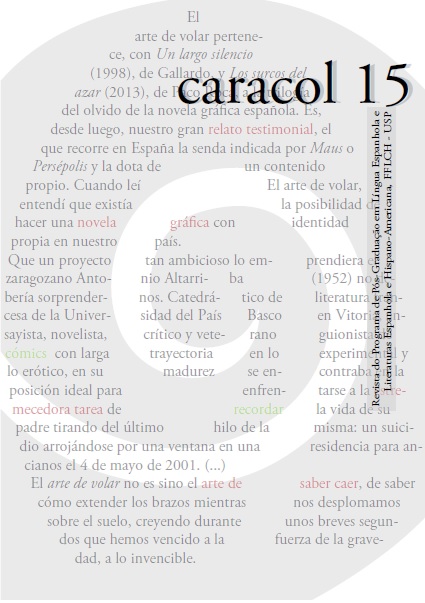Juan L. Ortiz and Buddhism: emptiness and the rewriting of pain
DOI:
https://doi.org/10.11606/issn.2317-9651.v0i15p394-415Keywords:
poetry, emptiness, buddhismAbstract
More than once, Juan L. Ortiz in his poetic writing suggested possible references in his poetry to specific aspects of the Zen Buddhist doctrine. In his work, light is the main tool for delineating the forms that underlie the unfolding of natural matter. This poetry, guided by an “enlightening” will, insists on projecting light where darkness dominates. Buddhist enlightenment (the dissolution of the mind darkness that generates suffering and pain) is the unfailing horizon towards which the path to dharma leads. And the poetry of Ortiz, too, seems to slowly and tirelessly persevere on that path. In this paper, we try to suggest some approaches to his poetry, to key notions of the Buddhist doctrine, especially the emptiness one, the last nature of the pathway of human life, as Buddhism understands it.
Downloads
References
Conti, Jorge. “Juan L. Ortiz en el límite”. In: Poesía y poética. 18, 1995, 64-76.
Del Barco, Oscar. Juan L. Ortiz: Poesía y ética. Córdoba: Alción Editora, 1996.
Favela Bustillo, Tania. “La armonía del devenir: zen y poesía en Juan L. Ortiz”. In: Acta Poética. 35.2, 2014, 35-49.
Gramuglio, María Teresa. “Juan L. Ortiz, un maestro secreto de la poesía argentina”. In: Cuadernos Hispanoamericanos. 644, 2004, 45-57.
Gueshe Kelsang Gyatso. Budismo moderno. El camino de la compasión y la sabiduría. Alhaurín el Grande (Málaga): Tharpa, 2011.
Dumoulin, Heinrich. “Religión y política. Evolución del budismo japonés hasta nuestros días”. In: Mircea Eliade (org.). Historia de las creencias y de las ideas religiosas: Desde la época de los descubrimientos hasta nuestros días. Barcelona: Herder, 1999, 409-516.
Lezama Lima, José. “El pabellón del vacío”. In: Fragmentos a su imán. Poesía completa. La Habana: Letras Cubanas, 1985, 547-549.
Saer, Juan José. “Liminar: Juan”. In: Juan L. Ortiz. Obra completa. UNL: Santa Fe, 1996, 11-14.
Suzuki, Daisetz T. “¿Qué es el zen?”. In: El zen y la cultura japonesa. Barcelona: Paidós, 1996, 13-23.Bonsai en el Trópico. Disponível em: <http://www.bonsaieneltropico.com/tokonoma.htm>. Acesso em: 22 ago 2016.Zampini, Fabián Humberto. Tesis doctoral. FFyH/UNC, Córdoba: 2017.
Downloads
Published
Issue
Section
License
Copyright (c) 2018 Fabián Zampini

This work is licensed under a Creative Commons Attribution-NonCommercial 4.0 International License.
Authors who publish in this journal agree to the following terms:
- Authors retain copyright and grant the journal the right of first publication, with the work simultaneously licensed under a Creative Commons Attribution License, which permits the dissemination of the work with recognition of authorship and initial publication in this journal.
- Authors are allowed to enter into additional contracts separately for non-exclusive use of the version of the work published in this journal (such as publication in an institutional repository or as a book chapter), with recognition of authorship and initial publication in this journal.
- Authors are allowed and encouraged to publish and distribute their work online (e.g., in institutional repositories or on their personal page) at any point before or during the editorial process, as this can generate productive changes, as well as increasing the impact and citation of the published work (see The effect of open access…).




